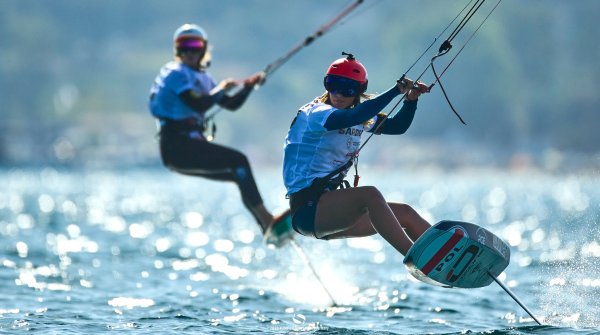June is celebrated as Pride Month for the LGBTQ+ community. During this time, many demos and actions against discrimination take place around the world. Many companies then incorporate the rainbow flag into their marketing and logos as a symbol of the movement. Sports also use the action for promotional purposes. But again and again the discussion arises whether this benefits inclusion. Do colorful flags really make sports more unprejudiced and safer for people of all sexualities? Or does the short-term celebration of the queer scene do more harm to the movement?
Sport has a long tradition as a platform for political messages. Even in ancient times, sports competitions were used to demonstrate power and national identity. Today, the sports industry continues to be a popular arena that players use for goals beyond sports. Take former NFL player Colin Kaeperinick, who knelt during the traditional playing of the national anthem to protest racism and police violence in the United States. His protest sparked a nationwide debate and found imitators in solidarity in many places.
Increasingly, entire teams are also positioning themselves against discrimination and misanthropy in sports. Some soccer clubs, for example, regularly take part in social campaigns or wear captain's armbands in rainbow colors - and not only during #pridemonth. For the World Cup in Qatar, there was worldwide debate about whether a tournament of this magnitude should be held in a country that still criminalizes homosexuality.
In such debates, the question often arises as to whether political positioning in sport is appropriate or whether clubs, athletes and sponsors would be better off remaining politically neutral. Critical voices note that sport is the "most beautiful pastime in the world" and that political or social grievances should be dealt with elsewhere.
In contrast, however, many athletes experience discrimination on the basis of their ethnicity or sexuality. They want to use their reach and their role model function to highlight problems and to break down prejudices and discriminatory structures among fans through their personal stories. In addition, many athletes emphasize that human rights are not a political position, so standing up for them is always and everywhere justified.
More and more athletes see it that way and stand up for LGBTQ+ rights in public - be it as part of the community or as allies. Athletes are increasingly coming out publicly, although this often only happens after the end of their professional career. Nevertheless, such actions contribute significantly to the visibility of a disadvantaged group of people. They expose discriminatory structures and thus help to break stereotypical ideas and promote inclusion and diversity.
The more visible the LGBTQ+ community is in everyday sports, the more positive the effect on civil society discussions and the positioning of sponsors and clubs. For example, U.S. soccer player Megan Rapinoe repeatedly uses her reach to advocate for equality and against discrimination in sports. She is one of the most well-known queer activists today. Men's soccer, unfortunately, is still much more reticent about this. But the growing visibility of LGBTQ+ athletes is increasingly opening up space for discussions with straight athletes, clubs, and sponsors about how to shape with and against each other in sports. As a result, this debate is spilling over into the rest of civil society, and at the same time is creating momentum for inclusion that goes beyond sports.
Companies like to exploit socially relevant topics for their messages. Greenwashing, sportswashing or pinkwashing are popular means of image polishing. But there are more reasons why sports companies have also increasingly focused on the LGBTQ+ community in recent years: On the one hand, it is attractive as a consumer group they want to attract to their brand. On the other hand, companies want to be attractive to professionals, clients and other target groups. After all, companies that take their commitment to greater diversity and inclusion seriously are more popular.
This is why sponsors sometimes pay millions to sports clubs or events to showcase their brand. They benefit from the positive image of famous athletes, who often also act as advertising figures for a brand. For sports clubs, athletes are both a figurehead and a source of income - a position from which they can also take a stand on civil society issues.
Problems arise when a club or athletes have views that differ from those of the sponsor, for example, when they make anti-queer statements. Sports companies should take responsibility here by distancing themselves from the statements and, if necessary, even terminating advertising contracts. However, the situation also exists the other way around: for example, when athletes or sports clubs are supported by sponsors who come from a country that criminalizes homosexuality or otherwise holds anti-LGBTQ+ positions.
This can pose major problems for athletes*. This is because, depending on the sport, securing the entire training program and equipment may depend on sponsors. Inclusive sports companies can contribute here by increasing market pressure on problematic sponsors.
Another problem is pinkwashing. Here, companies use inclusion or solidarity with the LGBTQ+ community as a bogus marketing tactic. In reality, however, they do not effect significant change. When pinkwashing becomes public, companies reap a lot of criticism. However, many sports fans cannot always distinguish real allyship from superficial advertising campaigns. This makes it all the more important for athletes, companies and civil society authorities to have a decisive discussion about genuine solidarity and to point out positive examples.
Corporate social responsibility (CSR) is not a new invention, but a central component of a desirable corporate philosophy. Behind it is the idea that companies develop concepts that integrate civic concerns such as social issues or sustainability into their business activities - and thus take responsibility for the impact of their actions on society.
CSR has an impact on a company's own appearance and behavior, on corporate structures and advertising measures or sponsorship agreements. And, of course, also on how the company deals with people from the LGBTQ+ community. This includes not only public actions such as showing the rainbow flag, but also the reduction and exclusion of discriminatory processes, for example by avoiding stereotypes or derogatory language in advertising or recruiting.
Likewise, CSR of companies in the sports industry includes using their own influence in an authentic and sustainable way to shape sports. And thus contribute to an inclusive and diverse space where the focus can actually be on the physical competition and not on the sexuality of the participants.
- ISPO awards
- Mountain sports
- Bike
- Design
- Retail
- Fitness
- Health
- ISPO Job Market
- ISPO Munich
- ISPO Shanghai
- Running
- Brands
- Sustainability
- Olympia
- OutDoor
- Promotion
- Sports Business
- ISPO Textrends
- Triathlon
- Water sports
- Winter sports
- eSports
- SportsTech
- OutDoor by ISPO
- Heroes
- Transformation
- Sport Fashion
- Urban Culture
- Challenges of a CEO
- Trade fairs
- Sports
- Find the Balance
- Product reviews
- Newsletter Exclusive Area
- Magazine








